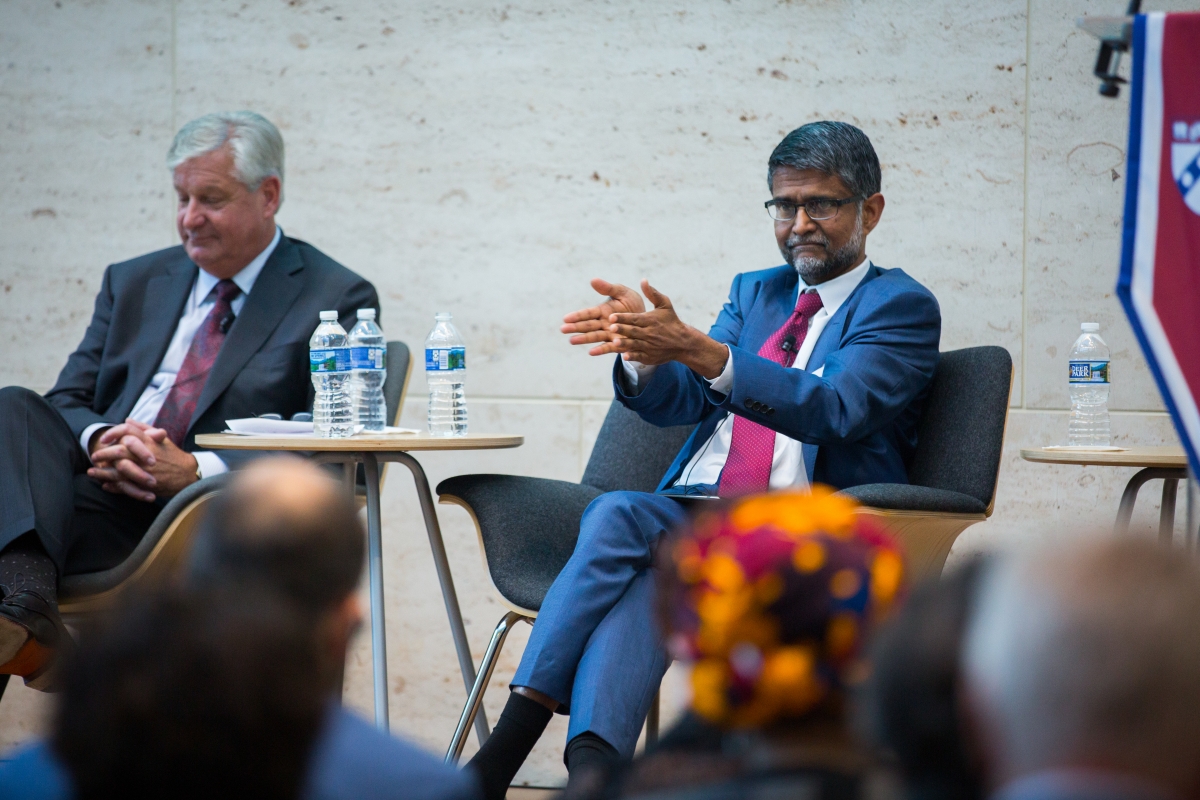
Published by Penn Today
Authored by Jill DiSanto
Beyond the Walls: The University of the Future” brought scholars, administrators, and technology experts to Penn’s Perry World House last week to discuss the future of higher education and the disruption of the traditional “brick and mortar” college campus.
A demand for 21st-century skills in the workplace, combined with globalization and technology, has created an urgency for higher education to meet the needs of a changing economy. That’s specifically what the summit addressed in its themes—The Global University, Digital University, Equitable University, and Lifelong University.
The summit addressed how higher education must address the needs of a changing economy. Photo: Katherine Veri, Veri Productions
Peter Decherney, faculty director of Penn’s Online Learning Initiative and one of the summit’s co-organizers, says the most exciting part of the summit was the substantial turnout, but the panel on “The Lifelong University” revealed a forward-looking vision for Penn.
“The definitions of ‘classroom’ and ‘teacher’ are being re-conceived in updating the core mission of the university for the needs of 21st century students,” says Decherney, a professor of English and cinema and media studies in the School of Arts and Sciences.
The “Lifelong University” panel was comprised of deans Pam Grossman of the Graduate School of Education (GSE), Steven Fluharty of Penn Arts and Sciences, John L. Jackson Jr., of the School of Social Policy & Practice (SP2), and Vijay Kumar, the Nemirovsky Family Dean of the School of Engineering and Applied Science.
Grossman said that the future of higher education is in interdisciplinary problem-based collaboration that incorporates divergent perspectives and multiple stakeholders.
“One of the things that we thought about in GSE is the desire of our alumni to be more engaged and to continue learning,” Grossman said. “How do we as a professional school continue to support them? Through our new center for innovation, Catalyst, we’ve already experimented with ways to engage alumni.”
Jackson, a Penn Integrates Knowledge Professor, suggested that learning is borderless.
“We are proving that excellent learning opportunities don’t have to stop at the entry gates of any university,” said Jackson, who added that’s Penn’s researchers constantly exchange best practices on increasing access to research and valuable expertise. “By launching new online learning divisions like OpenSP2, developing more massive open online courses, or MOOCs, and innovating hybrid programming within our multiple degrees programs at SP2, we are demonstrating our commitment to reaching lifelong learners around the world.”
Fluharty said, “Any discussion about lifelong learning starts and ends with the same core values that we apply to our bachelors and Ph.D. programs. “Lifelong learning begins with our traditional, residential undergraduates. The foundation of their liberal arts education is preparing them for a lifetime of change that none of us can anticipate.”
Kumar said lifelong learning is a requirement that bears no expiration date.
“Lifelong learning is no longer an option in a fast-changing technological landscape; it is necessary,” Kumar explained. “A university’s commitment to its students cannot be simply limited to the time they are enrolled in a degree program.”
Penn Provost Wendell Pritchett, who moderated the panel, added that Penn transcends the limitations usually found in the higher education landscape.
“At Penn,” said Pritchett, “we are strongly committed to shaping the future of teaching and learning around the world. Our pioneering work in online learning extends the resources of this University beyond traditional boundaries of age and geography, creating a truly lifelong global university.”
Many adults go back to school to take a cluster of courses in a specific area that allows them to advance professionally, or launch a new career, explained Nora Lewis, the vice dean for professional and liberal education in Penn Arts and Sciences. “We see an increasing number of adults with a degree come back to take courses to refresh and retool.
“This is going to become more of the ‘new normal’ as we move into the University of the Future,” said Lewis, who participated in the panel discussing the Equitable University.
Alec Ian Gershberg, another organizer who is a two-time Penn alumnus and senior fellow at Penn GSE’s International Educational Development Program, said key points consistently emerged across the day’s four panels.
A senior lecturer in the School of Arts and Sciences, he is also a founding member of the University of the Future Network, which was designed to analyze the role universities must embrace to remain relevant in the digital age, while fostering policy dialogue within academic institutions and among stakeholders.
“Teaching online is neither cheaper, nor easier, than teaching face-to-face, and those who have taught online have nearly universally found that it improved their face-to-face teaching,” Gershberg said. “Most importantly, the silent revolution from the impact of digital technologies on teaching and learning is likely to be the massive data generation potential, and how it can allow faculty to understand how students learn, where they need support, and how to tailor the educational experience and pedagogical strategies to diverse student needs.”
The third co-organizer was Rebecca Stein, the executive director of the Penn Online Learning Initiative.
The summit was sponsored by the Office of the Provost, in cooperation with the Online Learning Initiative and the University of the Future Network. It was co-sponsored by the Graduate School of Education, the School of Arts and Sciences, and Perry World House.
